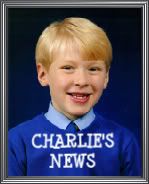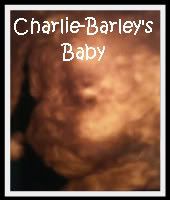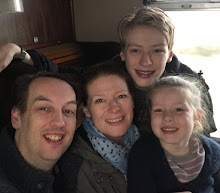Hello again. I've only just realised that I've never really put any details about when Charlie was diagnosed with HLHS, and what happened when he was born. Although I know a lot of people who read his blog already know his story, we've picked up a lot of new friends along the way who don't! So here it is....
We were thrilled and terrified to discover we were expecting our third child. I had miscarried our first baby at 12 weeks, and our second son, Will, died fifteen minutes after he was born because of a lethal genetic condition.
Will’s condition is autosomal recessive, which means that every child my husband and I conceive has a 25% chance of inheriting this fatal condition. Needless to say, when I became pregnant again, we were full of dread that this child would also be doomed to leave us within minutes of birth.
We were told at the 14-week scan that all was looking very good, and the doctors were cautiously optimistic that we might have escaped MGS this time. We were told that the 16-week scan would be 'crunch time' - at which the baby would be well-enough developed for the doctors to confirm whether or not we had passed on Meckel-Gruber syndrome to this child too.
As I lay on the scanning table at 16 weeks, the radiographer and doctor - with whom we were already on first-name terms having already had a 'unusual' pregnancy not too long before - told us that our child was clear of the kidney and brain problems which would have indicated MGS.
However, we had barely let out a whoop of delight, when the radiographer told us to 'Hang on minute, I don't think the heart is normal. It looks too small.' We were horrified.
As well as having MGS, Will had been diagnosed with a major congenital heart defect called Hypoplastic Left Heart Syndrome - a condition where the left side of the heart does not develop. It had been assumed by all the medics at the time that this was linked in with his MGS, as cardiac abnormalities had been reported previously in other cases of the syndrome.
I asked the radiographer if it was the same heart condition as Will had - and she said she was virtually certain it was.
The cardiac consultant was called to the room and confirmed that it was true. Our child had HLHS.
We were blown away. Rather than being upset, I was furious, and ranting at everyone in the room. How could this be? How could something ELSE be wrong with one of our children? How many more potentially fatal conditions would we be forced to deal with? We had braced ourselves for miscarriage or Meckel-Gruber syndrome, but not this - something new and horrible.
We wanted to know whether we were having a boy or a girl, but the baby wouldn't co-operate to let us find out.
We were taken to one of the 'bad news rooms' - we knew it well, as it was where we'd been taken after Will was diagnosed.
The cardiologist, with the aid of many, many scribbled diagrams and notes and statistics, explained to us what the future held.
Without treatment, the child would definitely die within a few days of birth. We could opt for termination, compassionate care - taking the child home and leaving nature to take its course, or three-stage, high-risk palliative surgery.
The baby would need at least three major, open-heart surgeries before it started school. These operations could not cure the condition - merely enable the heart to continue functioning. The odds of getting it through these operations successfully to age five were around 60-65%.
There were many other issues that could crop up over the course of the child's life, and there was a strong possibility that the single ventricle the child did have would begin to fail in late adolescence or early adulthood, and that transplant, with all its attendant problems, would then be the only option available. There were no guarantees.
Treatment for the condition was relatively new, and the oldest child in the country was only around 13 years old at the time.
I think the medical team knew what was coming as we had already opted to take a pregnancy to term knowing that the baby was 'incompatible with life'. My husband, Pete, and I looked at each other. When we were having Will, we had wished and wished that there was even a 1% chance of him surviving, but we knew there was no hope at all.
This child, despite having a major heart defect, had a chance - 60-65% chance in fact - and we grabbed it with both hands.
Two weeks later when we returned for our next scan, our baby was in a better position and we were told that it was a 'he'! We named him Charlie William - his middle name after his big brother.
As my pregnancy progressed, we were stunned by the support we received from everywhere. We received letters and cards from people we had never even met, telling us how they were thinking of us and praying for us. Everyone was resolutely positive - and so were we.
I had to deliver Charlie at a hospital 150miles from home, so he could be near to the children's hospital which performed the high-risk surgery.
He finally arrived two weeks late on November 5, 2003. He came into the world shouting, weighing 8lbs 13oz. He was pink and feisty, and his apgar scores were nine and nine. We couldn't have asked for more.
His first surgery was performed at two days old. We were calm and resolute as we watched him anaesthetised, and the six-and-a-half hour wait while he was in theatre seemed to go on for ever.
Pete and I, and my parents were sitting in a little waiting room drinking bad coffee when the nurse who had been caring for Charlie before he went to theatre came running in and shouted 'He's fine! He's in ITU!'. En masse we burst into tears of relief. Everything went smoothly with Charlie's recovery and we were home a mere 12 days post-op.
Everything went smoothly with Charlie's recovery and we were home a mere 12 days post-op.
His second-stage surgery took place - uneventfully - when he was five months old, and we were home only six days later.
Since then, Charlie has been remarkably robust and well, and seems to be pretty much unaffected by his heart problem. He runs about, rides his bike, goes to playschool and is way ahead of all his developmental milestones. He is ahead of his peers as far as reading and writing is concerned. People are always telling us that you would never know there was anything wrong with him.
He is due his third (and hopefully final!) surgery before he starts school, and although we are dreading taking him back to hospital - he has had no admissions since he was five months old - we have every faith that he will do well and will be back home with us in no time.
Of course, there is no denying that life as the parent of a child with HLHS is fraught with worry. Even with a child as well as Charlie, there is always the fear that each cold or sniffle could be the start of something big.
There's also the ever-present fear that he may not see old age - but nothing in life is certain - HLHS or not.
He has been a blessing to us in so many ways - he and his brother have taught us so much. Living day-to-day with a life-threatening condition really makes you get your priorities straight, and teaches you to appreciate every minute of every day. You can never be sure of tomorrow, so you make the most of today. We never take Charlie for granted - even if he is being crabby (which doesn't happen very often!) we're just glad that he's actually here to BE crabby!
Every time he achieves something new, he makes us so proud. He is a delightful, sunny-natured, chatty, smiley little boy who is loved by all who know him. Our hearts sing as we watch him grow. We are proud and privileged to be able to call him our son.
PS If you're wondering how Charlie's hospital checkup went yesterday, the details are in the previous post!
We were thrilled and terrified to discover we were expecting our third child. I had miscarried our first baby at 12 weeks, and our second son, Will, died fifteen minutes after he was born because of a lethal genetic condition.
Will’s condition is autosomal recessive, which means that every child my husband and I conceive has a 25% chance of inheriting this fatal condition. Needless to say, when I became pregnant again, we were full of dread that this child would also be doomed to leave us within minutes of birth.
We were told at the 14-week scan that all was looking very good, and the doctors were cautiously optimistic that we might have escaped MGS this time. We were told that the 16-week scan would be 'crunch time' - at which the baby would be well-enough developed for the doctors to confirm whether or not we had passed on Meckel-Gruber syndrome to this child too.
As I lay on the scanning table at 16 weeks, the radiographer and doctor - with whom we were already on first-name terms having already had a 'unusual' pregnancy not too long before - told us that our child was clear of the kidney and brain problems which would have indicated MGS.
However, we had barely let out a whoop of delight, when the radiographer told us to 'Hang on minute, I don't think the heart is normal. It looks too small.' We were horrified.
As well as having MGS, Will had been diagnosed with a major congenital heart defect called Hypoplastic Left Heart Syndrome - a condition where the left side of the heart does not develop. It had been assumed by all the medics at the time that this was linked in with his MGS, as cardiac abnormalities had been reported previously in other cases of the syndrome.
I asked the radiographer if it was the same heart condition as Will had - and she said she was virtually certain it was.
The cardiac consultant was called to the room and confirmed that it was true. Our child had HLHS.
We were blown away. Rather than being upset, I was furious, and ranting at everyone in the room. How could this be? How could something ELSE be wrong with one of our children? How many more potentially fatal conditions would we be forced to deal with? We had braced ourselves for miscarriage or Meckel-Gruber syndrome, but not this - something new and horrible.
We wanted to know whether we were having a boy or a girl, but the baby wouldn't co-operate to let us find out.
We were taken to one of the 'bad news rooms' - we knew it well, as it was where we'd been taken after Will was diagnosed.
The cardiologist, with the aid of many, many scribbled diagrams and notes and statistics, explained to us what the future held.
Without treatment, the child would definitely die within a few days of birth. We could opt for termination, compassionate care - taking the child home and leaving nature to take its course, or three-stage, high-risk palliative surgery.
The baby would need at least three major, open-heart surgeries before it started school. These operations could not cure the condition - merely enable the heart to continue functioning. The odds of getting it through these operations successfully to age five were around 60-65%.
There were many other issues that could crop up over the course of the child's life, and there was a strong possibility that the single ventricle the child did have would begin to fail in late adolescence or early adulthood, and that transplant, with all its attendant problems, would then be the only option available. There were no guarantees.
Treatment for the condition was relatively new, and the oldest child in the country was only around 13 years old at the time.
I think the medical team knew what was coming as we had already opted to take a pregnancy to term knowing that the baby was 'incompatible with life'. My husband, Pete, and I looked at each other. When we were having Will, we had wished and wished that there was even a 1% chance of him surviving, but we knew there was no hope at all.
This child, despite having a major heart defect, had a chance - 60-65% chance in fact - and we grabbed it with both hands.
Two weeks later when we returned for our next scan, our baby was in a better position and we were told that it was a 'he'! We named him Charlie William - his middle name after his big brother.
As my pregnancy progressed, we were stunned by the support we received from everywhere. We received letters and cards from people we had never even met, telling us how they were thinking of us and praying for us. Everyone was resolutely positive - and so were we.
I had to deliver Charlie at a hospital 150miles from home, so he could be near to the children's hospital which performed the high-risk surgery.
He finally arrived two weeks late on November 5, 2003. He came into the world shouting, weighing 8lbs 13oz. He was pink and feisty, and his apgar scores were nine and nine. We couldn't have asked for more.
His first surgery was performed at two days old. We were calm and resolute as we watched him anaesthetised, and the six-and-a-half hour wait while he was in theatre seemed to go on for ever.
Pete and I, and my parents were sitting in a little waiting room drinking bad coffee when the nurse who had been caring for Charlie before he went to theatre came running in and shouted 'He's fine! He's in ITU!'. En masse we burst into tears of relief.
 Everything went smoothly with Charlie's recovery and we were home a mere 12 days post-op.
Everything went smoothly with Charlie's recovery and we were home a mere 12 days post-op.His second-stage surgery took place - uneventfully - when he was five months old, and we were home only six days later.
Since then, Charlie has been remarkably robust and well, and seems to be pretty much unaffected by his heart problem. He runs about, rides his bike, goes to playschool and is way ahead of all his developmental milestones. He is ahead of his peers as far as reading and writing is concerned. People are always telling us that you would never know there was anything wrong with him.
He is due his third (and hopefully final!) surgery before he starts school, and although we are dreading taking him back to hospital - he has had no admissions since he was five months old - we have every faith that he will do well and will be back home with us in no time.
Of course, there is no denying that life as the parent of a child with HLHS is fraught with worry. Even with a child as well as Charlie, there is always the fear that each cold or sniffle could be the start of something big.
There's also the ever-present fear that he may not see old age - but nothing in life is certain - HLHS or not.
He has been a blessing to us in so many ways - he and his brother have taught us so much. Living day-to-day with a life-threatening condition really makes you get your priorities straight, and teaches you to appreciate every minute of every day. You can never be sure of tomorrow, so you make the most of today. We never take Charlie for granted - even if he is being crabby (which doesn't happen very often!) we're just glad that he's actually here to BE crabby!
Every time he achieves something new, he makes us so proud. He is a delightful, sunny-natured, chatty, smiley little boy who is loved by all who know him. Our hearts sing as we watch him grow. We are proud and privileged to be able to call him our son.
PS If you're wondering how Charlie's hospital checkup went yesterday, the details are in the previous post!









1 comment:
Thanks for reviewing Charlie's history for us. I am glad that things went well at the hospital for him. I know you were so thankful. I will be following Charlie's blog in the days ahead. Thanks for sharing such a sweet little boy with the world.
I noticed the basket of flowers you sent to Isaac's memorial service. They were beautiful. You have been so very thoughtful.
We will continue to pray for Charlie to receive good reports from his doctors.
Isaac's FL Grandma, Lynn
Post a Comment